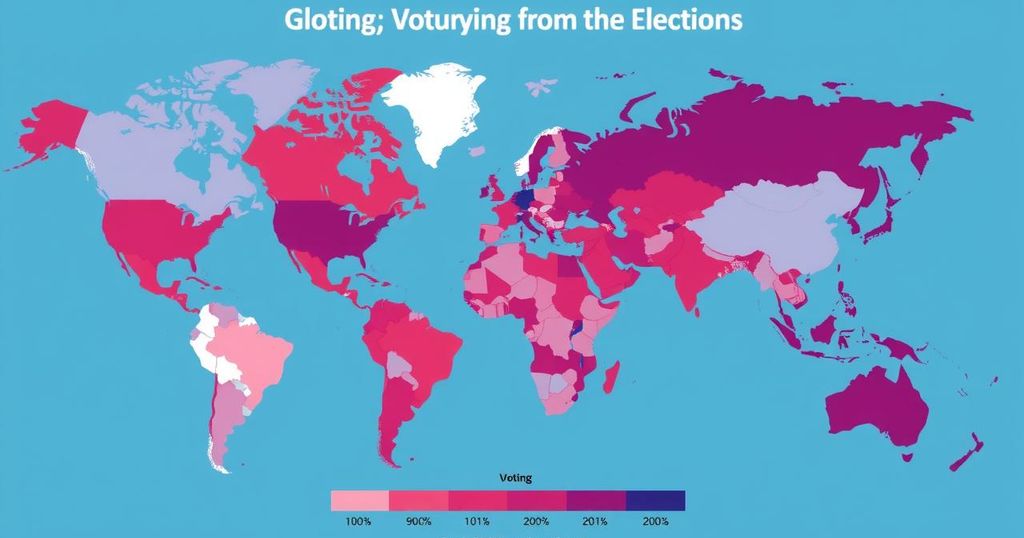Weather
World news
AP, ASIA, ASSOCIATED PRESS, CENTER FOR DISASTER PHILANTHROPY, CHILE, CLIMATE, CLIMATE CHANGE, ESTE, GET, GETTY IMAGES, KRISTIN, MEGAN VARNER, NATIONAL CENTERS FOR ENVIRONMENTAL INFORMATION, NATURAL DISASTER, NATURAL DISASTERS, NEPAL, NI, PHILIPPINES, PHOTO, SIMON STIELL, SOUTH AMERICA, U. N, U. N. CLIMATE CHANGE, U. S, VALPARAISO, VALPARAÍSO, VIÑA DEL MAR, VINA DEL MAR, WILDFIRES
Jamal Abdullah
0 Comments
Overview of 2024’s Most Devastating Natural Disasters
In 2024, deadly natural disasters claimed thousands of lives and inflicted monumental financial damages worldwide, exacerbated by growing climate change effects. This overview details ten of the year’s most catastrophic events, illuminating the urgent need for improved disaster preparedness and financial support for affected regions.
In 2024, the world experienced a series of devastating natural disasters that resulted in significant loss of life and substantial financial implications. Climate change has been identified as a critical factor making such disasters increasingly severe. More than twenty weather-related events in the United States alone resulted in losses exceeding one billion dollars each by November 1. At the U.N. Climate Change Conference, officials committed to enhancing financial assistance for vulnerable nations, recognizing the urgent need to address these challenges. The following are ten of the deadliest natural disasters of the year, focusing on singular catastrophic events rather than prolonged emergencies like monsoons or persistent floods.
Firstly, Tropical Storm Trami struck the Philippines in late October, leading to at least 141 fatalities due to severe flooding and landslides. Chile suffered from the deadliest forest fires in its history, killing at least 136 people as fires ravaged the Valparaíso region in early February. In September, Nepal was struck by heavy rains and subsequent landslides, resulting in at least 192 deaths and leaving many others missing, with the Kathmandu Valley particularly hard hit.
The New Year began with a powerful 7.6 magnitude earthquake in Japan that claimed 213 lives and caused the destruction of nearly 2,000 homes. Heavy flooding later struck Spain, resulting in a tragic death toll of at least 224, predominantly in the Valencia region. Hurricane Helene, which made landfall in North Carolina in late September, was the deadliest storm in the U.S. hurricane season, resulting in 225 deaths and an estimated $60 billion in damages.
In Ethiopia, a series of landslides triggered by intense rains led to 257 confirmed deaths by late July. Typhoon Yagi wreaked havoc across Southeast Asia, with over 500 deaths reported across various countries, including Vietnam and Myanmar, in September. Papua New Guinea faced unprecedented loss when a landslide in May resulted in at least 670 fatalities, with fears that the true count may have been much higher.
Lastly, a brutal heat wave during the Hajj pilgrimage in Saudi Arabia in June resulted in the deaths of at least 1,300 individuals, primarily affecting unregistered pilgrims without access to cooling facilities. These incidents highlight the critical need for immediate action to mitigate the risks associated with natural disasters exacerbated by climate change.
The subject of natural disasters remains pertinent as these events increasingly threaten lives and economies worldwide. In 2024, the effects of climate change have intensified the impact of natural phenomena, leading to substantial loss of life and economic costs. Recognition of this relationship has prompted international discussions surrounding climate change policy, disaster recovery, and funding to assist vulnerable communities. The data reflected in the reported disasters asserts the urgency for concerted efforts toward effective disaster risk management.
The year 2024 has underscored the destructive power of natural disasters, with significant casualties resulting from diverse events such as storms, earthquakes, wildfires, and extreme temperatures. Climate change continues to play a crucial role in the frequency and severity of these phenomena, which necessitates urgent international cooperation and enhanced financial resources to safeguard vulnerable populations and infrastructure. The commitment made at COP29 emphasizes the collective responsibility to prepare for and mitigate the impacts of future disasters.
Original Source: www.usnews.com




Post Comment